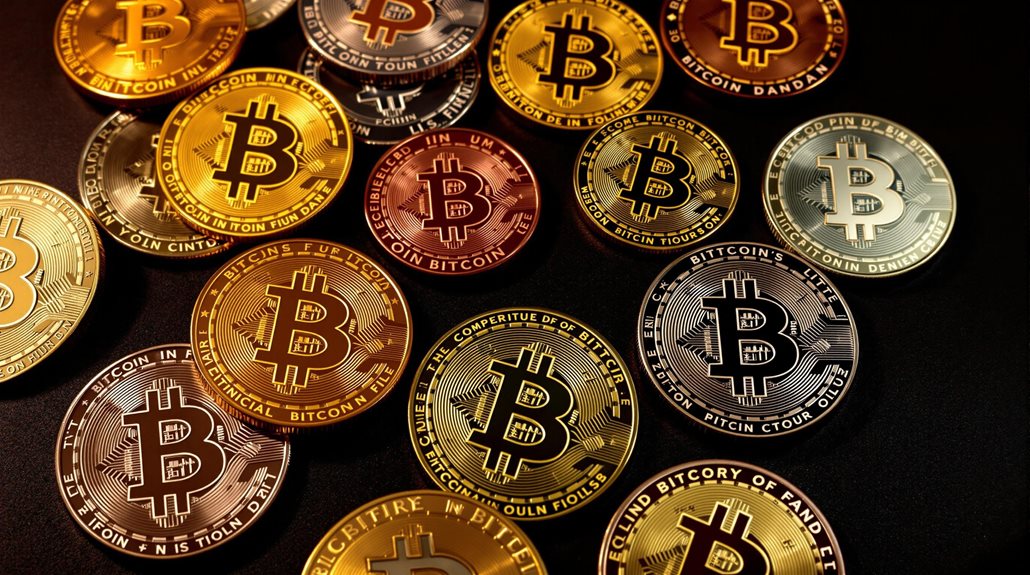Bitcoin's value isn't backed by physical assets or government guarantees. Instead, it's supported by its limited supply of 21 million coins, growing market demand, and widespread adoption. The cryptocurrency's worth comes from people's trust in its decentralized network, security features, and ability to work without banks or middlemen. Mining costs, institutional investment, and increasing acceptance by businesses also strengthen Bitcoin's position. There's much more to understand about what makes this digital currency valuable.

Bitcoin's value stems from a complex web of factors that work together in the cryptocurrency market. Unlike traditional currencies, Bitcoin isn't backed by any government or physical commodity. Instead, its value comes from a combination of scarcity, utility, and market demand.
One of Bitcoin's key features is its limited supply of 21 million coins. This built-in scarcity means that as more people want to buy Bitcoin, its price tends to go up since there's only so much to go around. Every four years, the rate at which new Bitcoins are created gets cut in half, making them even harder to obtain. The stock-to-flow ratio has historically correlated with significant price increases following these halvings. Trading activity can be especially volatile, with prices sometimes fluctuating by thousands per day.
The growing acceptance of Bitcoin as a payment method has helped boost its value. More businesses are starting to accept it for goods and services, and some see it as a way to protect against inflation. Big companies and investment firms have also started buying Bitcoin, which has made more people trust it as a serious investment. Bitcoin has become a crucial financial tool, providing banking access to over 1.7 billion unbanked individuals worldwide.
The price of Bitcoin moves up and down based on what people think about it. News stories, government regulations, and the overall economy all affect how people feel about Bitcoin. When there's positive news or strong economic uncertainty, more people might want to buy Bitcoin, pushing its price higher. However, this also means the price can drop quickly when there's negative news or market worry. Its decentralized nature makes it resistant to government manipulation and interference.
The cost of mining Bitcoin plays a role in its value too. Miners use powerful computers that consume lots of energy to create new Bitcoins, and these costs help set a kind of floor for Bitcoin's price. The security of Bitcoin's network and improvements in its technology also affect how valuable people think it is.
Competition from other cryptocurrencies influences Bitcoin's value as well. While Bitcoin was the first and remains the most well-known cryptocurrency, it now shares the market with thousands of others. This competition affects its market share and price.
The way Bitcoin connects with regular banking and financial systems matters too. As it becomes easier to buy, sell, and use Bitcoin through traditional financial services, more people can access it. This increased accessibility, combined with growing institutional investment, helps support Bitcoin's value in the broader financial market.
However, like any market asset, Bitcoin's price can still change dramatically based on supply, demand, and market conditions.
Frequently Asked Questions
Can Governments Successfully Ban or Regulate Bitcoin?
While governments can ban Bitcoin within their borders, it's tough to completely stop its use due to its decentralized nature.
Countries like China have banned crypto transactions, but people still find ways to trade Bitcoin.
Regulators have had more success focusing on crypto exchanges and banking connections rather than Bitcoin itself.
International cooperation between countries is helping create more effective oversight, but full control remains challenging.
How Does Bitcoin Mining Affect the Environment?
Bitcoin mining has significant environmental impacts.
It uses as much electricity annually as Argentina and creates about 23 million tons of CO2 each year.
The mining process also generates e-waste similar to what the Netherlands produces.
It uses lots of water and needs large areas of land.
To offset just one year's worth of Bitcoin's carbon emissions, it would take planting nearly 4 billion trees – an area as big as Denmark.
What Happens to Bitcoin When All 21 Million Coins Are Mined?
When all 21 million bitcoins are mined around the year 2140, miners won't receive new bitcoins as rewards.
Instead, they'll only earn money from transaction fees when people send bitcoin to each other. These fees will likely increase to keep miners interested in maintaining the network.
Bitcoin's value might be affected since there won't be any new coins created, making the existing ones potentially more valuable due to their fixed supply.
How Safe Is Bitcoin Against Quantum Computing Threats?
Bitcoin faces some real risks from quantum computing. Around 25% of all bitcoins (worth about $500 billion) could be vulnerable to quantum attacks.
Scientists think a quantum computer might crack Bitcoin's security in just 30 minutes.
However, the crypto community isn't sitting idle. They're working on solutions like quantum-resistant algorithms and safer address types.
While the threat is serious, Bitcoin's developers are actively preparing to adapt the system against future quantum challenges.
Why Do Bitcoin Transaction Fees Fluctuate so Much?
Bitcoin transaction fees change a lot because of network congestion and basic supply and demand.
When more people want to send Bitcoin at the same time, there's competition for limited space in each block.
It's like a bidding war – users who want faster transactions offer higher fees.
The network can only process so many transactions at once, so during busy periods, fees go up as people compete for space.





